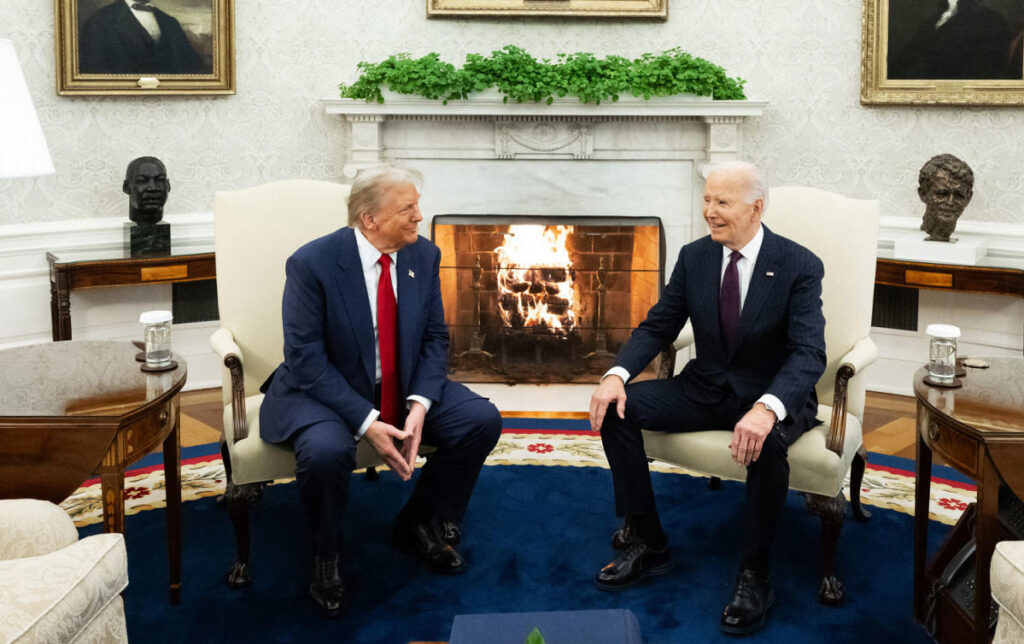In recent years, President Joe Biden has repeatedly stressed the significance of a peaceful transfer of power as a cornerstone of American democracy. His commitment to this principle was poignantly embodied when he hosted President-elect Donald Trump at the White House, offering a stark contrast to the tumultuous events of four years prior. On the same date in 2020, Trump displayed a blatant refusal to concede the election results, which he had questioned despite their legitimacy. His actions contributed to escalating tensions that culminated in the violent attack on the U.S. Capitol on January 6, 2021. In contrast, Biden’s cooperative engagement with Trump represents a reinvigoration of democratic norms that were severely tested during Trump’s presidency.
In an atmosphere marked by mutual respect, Trump and Biden sat side by side before reporters, which was unthinkable just a few years earlier. Trump later praised Biden’s leadership in an interview with the New York Post, highlighting a surprising camaraderie and praise for the smoothness of the transition process. The partnership between the two administrations extends beyond symbolic gestures; the Biden administration is actively facilitating the transition of power, collaborating with Trump’s team to ensure an orderly handover of federal governance. This cooperation stands in stark relief to the turmoil and chaos of 2020, when political tensions effectively stalled the transition process, leading to significant delays that undermined the operational stability of the executive branch.
Historical echoes of the past resonate in the current transition process, particularly concerning the General Services Administration (GSA). Just after the 2024 election, the GSA publicly acknowledged Trump’s victory and signaled its readiness to assist his transition team. This marked a pivotal shift from the previous administration’s approach, where Trump’s appointed leader purposely delayed recognizing Biden’s victory, thus hindering crucial arrangements essential for the seamless functioning of government operations. The absence of a timely transition ultimately favored the spread of Trump’s unfounded claims about the election, highlighting the importance of transparent and efficient transfer mechanisms in maintaining governmental integrity.
As the timeline toward important electoral processes continues, Vice President Kamala Harris finds herself poised to undertake a solemn and historical duty. On January 6, she will preside over the Senate’s certification of electoral votes, overseeing a process that she, as a former candidate, would acknowledge as her own electoral loss. This moment not only symbolizes the continuity of democratic processes but also serves as a reminder of the violent opposition these rituals faced. It is a duty that Vice President-elect JD Vance, in earlier statements, suggested he would not have performed during the last presidential transition, showcasing the contrasting attitudes toward democratic responsibility.
Individuals like Biden and Harris are leading by example during this politically charged period, emphasizing their commitment to the principles underpinning democratic governance. Their actions underscore a dedication to upholding traditions and norms that were undermined in recent years, portraying a leadership style focused on collaboration, respect, and the greater good of the nation rather than personal ambition. This represents a deliberate stance against the backdrop of a political environment that witnessed attempts to disrupt established norms and discredit electoral integrity.
Ultimately, these transitional moments serve as a brief restoration of normalcy in an otherwise intense political landscape. As Biden prepares to conclude his presidency, the collaboration with Trump’s transition team represents both a commitment to democratic values and a recognition of the bumpy road ahead. This transitional phase can be seen as a critical junction between the past and a possible future under Trump’s reign. Nevertheless, the values exhibited by Biden and Harris reaffirm a promise to uphold democracy and lay the groundwork for future leadership, inviting scrutiny and hope regarding the resilience of American political institutions.

